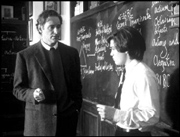THE EMPEROR’S CLUB
directed by Michael Hoffman
opens Nov. 22 at Meridian, Metro, and others
Michael Hoffman is the most academically minded director alive. A Rhodes Scholar who once taught public school in Seattle, Hoffman cast Oxford classmate Hughie Grant in their first film, Privileged, about snooty college students, and made Promised Land, based on a real tragedy involving Hoffman’s Idaho high-school classmates. His favorite actor is Juilliard-spawned Kevin Kline, who won first fame as a Shakespearean and whose every performance seems academic, as if inscribed by monks on fine parchment.
Kline’s stiffish style is just right for his role in The Emperor’s Club. He plays mild-mannered martinet William Hundert, who instills the boys at the elite St. Benedict’s prep school with classical virtues while drilling Greek and Latin into their skulls, circa 1976. Early in the film, he spots a kid cutting a corner in the quad and sternly instructs him to “follow the path”—not because it’s good for the grass, but because it’s good for the student. Like his predecessor Robert Donat in Goodbye, Mr. Chips, Hundert aspires to be headmaster, in order to parent a vast flock of boys. He’s in loco parentis with a vengeance.
Young Sedgewick Bell (Emile Hirsch, The Dangerous Lives of Altar Boys) does the standard bad things: flaunts his porn collection; makes class-clown comments; rows his pals to the Catholic girls’ school across the lake to talk the misses into a bit of skinny-dipping. Playing Gallant to this Goofus is Martin Blythe (Paul Franklin Dano), who plays by the rules and, like all Gallants in life, gets screwed by the unscrupulous Goofus. The whole movie is set up as a contest between the Forces of Classical Good—earnest scholars Blythe and Hundert—and the Forces of Modern Evil—bratty misbehaver Sedgewick and his maleficent father, West Virginia Sen. Bell (Harris Yulin).
Who gets farther in life, followers of the cynical bastard senator from West Virginia, or Hundert and his pupils? As Kline intones in the opening voice-over, “There are no surprises in this story.”
BASED ON AN Ethan Canin short story, Club is not half as risibly boring as Mr. Chips, nor as smarmily phony as Dead Poets Society, nor as flat-out horribly boring and fathomlessly false as Mr. Holland’s Opus. On the other hand, Kline’s marmoreal character isn’t as much fun as those of Robin Williams or Richard Dreyfuss.
Yet I must with regret give Mr. Hoffman a barely passing grade on this assignment. Kline needs someone to pump more blood into him, not drain him to chalky whiteness. And what seemed to make Hoffman the ideal director for this film—his similarity to Harvard Medical School doctor-turned-novelist Canin—actually made him the worst possible director for the job. Like Hoffman, Canin is a nice-guy overachiever obsessed with very simple moral dilemmas expressed in too-simple characters. Hoffman only achieved greatness when he delved into the shallowest dramatic material our culture has to offer—soap operas—in the superbly silly, not remotely academic Soapdish. He needs to get out of class, take his nose out of those dusty books, and take another plunge into mass culture. Carpe diem, Mr. Hoffman!









